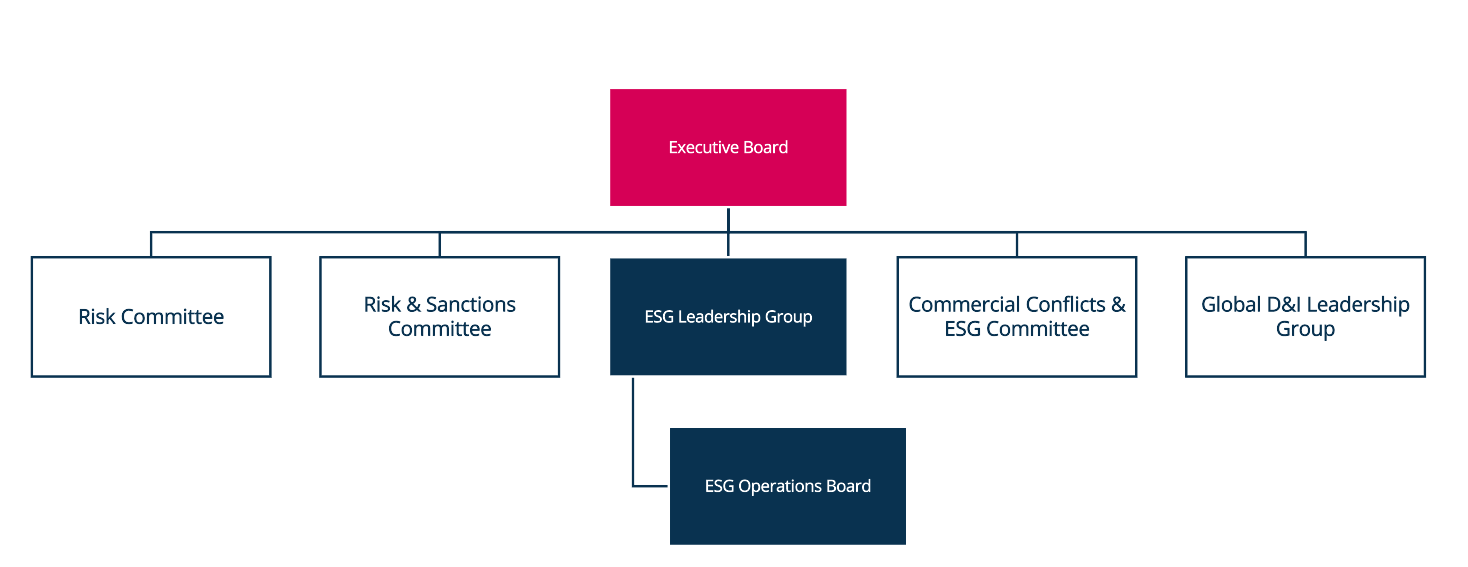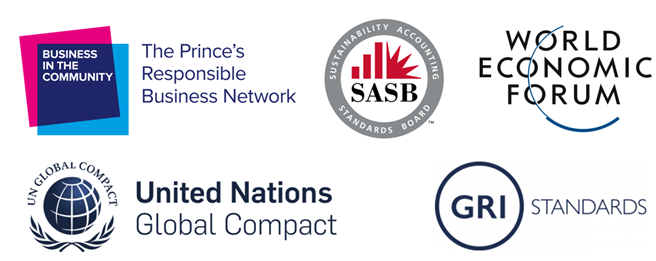Accountability and decision-making
The ESG & Sustainability issues most important to our stakeholders form the foundations of our ESG & Sustainability strategy, which has the engagement of and accountability from our Executive Board, along with all levels of leadership across our business. The oversight provided by the Board and its committees, include our ESG Leadership Group, ESG Operations Board, ESG & Commercial Conflicts Committee and Risk & Sanctions Committee. Our structure is below:

ESG risk taxonomy
We have implemented changes within our controls and the introduction of ESG risks within our risk taxonomy and management systems. Risk registers are held across leadership teams across our Legal Services, Legal Operations, Business Services and Central Services functions.
Reporting standards and frameworks
In addition to our mandatory reporting, requirements we actively engage in best practice and align to a series of global standards and disclosure frameworks, these are the: Global Reporting Initiative (GRI), Sustainability Accounting Standards Board (SASB), World Economic Forum Metrics, UN Global Compact Communication on Progress (in line with the Principles) and BITC Responsible Business Tracker.

Materiality
As part of our approach, the Group undertook an independent materiality assessment in 2021 to identify the ESG & Sustainability issues that are most important to all our stakeholders which then informed the foundations of our ESG & Sustainability strategy. We have committed to undertake this exercise every two years so we can be confident our strategy continues to remain fit for purpose.
Stakeholders
The relationships we build and sustain are critical to delivering our ESG & Sustainability strategy and ensuring long-term value. Through dialogue and listening, we can better understand our impacts and evolving stakeholder expectations. In turn, our stakeholders expect us to provide accurate, transparent information about our performance, ESG risks, and the measures we are taking to address them.
ESG client policy
Our ESG client policy is applicable to any new client, pro bono project and/or supplier as a means to ensure that we assess and consider the material issues within our ESG & Sustainability strategy when working with third parties. The policy sets out the process our colleagues globally must follow to assess the nature of the work and to determine whether it is consistent with our purpose and values.
Policies
We have a suite of policies that support the Group in its performance of our ESG & Sustainability strategy that ensures we remain compliant and manage potential risks and impacts. These policies are communicated to all colleagues via our internal channels and where applicable, training is provided.
Education & Training
A key focus of our ESG & Sustainability strategy is to empower our colleagues to be part of our collective effort to deliver positive outcomes for all our stakeholders. Education and training sits at the heart of this ambition, and we are committed to upskilling our colleagues to ensure they are well equipped to participate in a wide range of initiatives that deliver against our ESG targets and metrics. We design and deliver training and education for all levels of the business with additional bespoke training for senior leadership and the Executive Board.
Russia invasion on Ukraine
We have no offices in Russia or Ukraine, but we are doing all we can to support any of our colleagues and communities who are affected by this conflict. For the avoidance of doubt, we do not and will not act for the Russian government, Russian state-controlled entities or sanctioned entities or individuals.





















